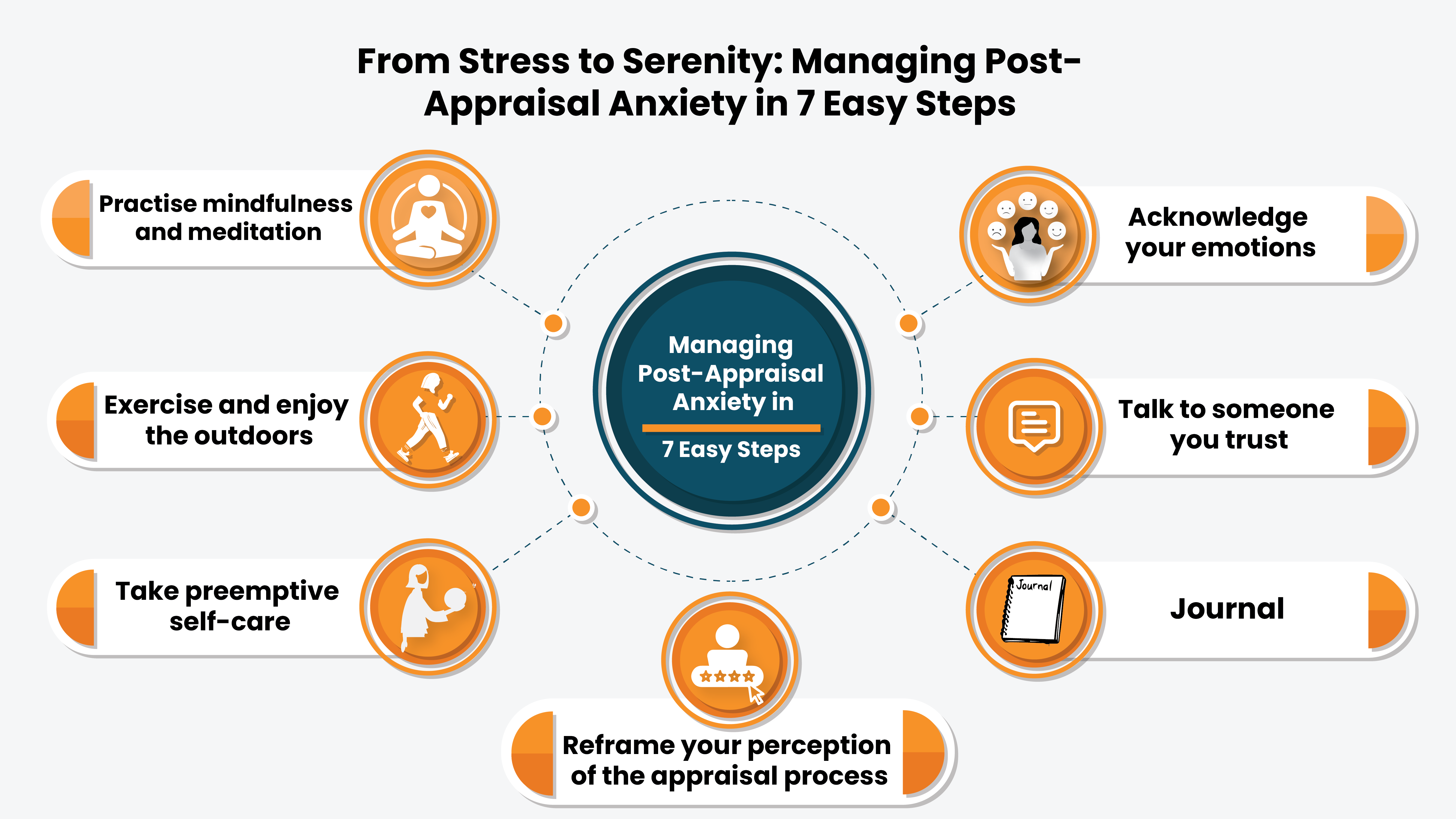From stress to serenity: Managing post-appraisal anxiety in 7 easy steps

Are you feeling anxious after receiving your performance appraisal at work? Don't worry, you're not alone. Many employees feel a mix of emotions including stress, worry and trepidation following the feedback session with their manager. However, it's important to remember that this is just one small aspect of your job and there are plenty of things you can do to manage these feelings and move towards serenity. In this article we'll share seven easy steps for managing post-appraisal anxiety so that you can focus on reaching your full potential in the workplace.
The stress of 'Appraisal Meetings'
The stress of appraisal meetings can be overwhelming, but there are easy steps you can take to manage your post-appraisal anxiety. By following these tips, you can stay calm and collected during your meeting, and avoid letting your anxiety get the best of you.

#Step 1: Acknowledge your emotions
It's normal to feel a range of emotions after your appraisal. You may feel anxious, stressed, angry, or even relieved. Acknowledging your emotions is an important first step in managing post-appraisal anxiety.
Try to take some time to reflect on why you're feeling each emotion. Are you worried about what your boss thought of your performance? Are you relieved that the process is over? Once you've identified why you're feeling each emotion, it will be easier to deal with them.
If you're feeling anxious or stressed, there are a few things you can do to start feeling better:
- Take some deep breaths and try to relax
- Talk to someone who can offer support and understanding
- Write down your thoughts and feelings in a journal
- Exercise or do something active to release built-up tension
If you're feeling angry, ask yourself if there's anything constructive you can do with that anger. Maybe there's something you can learn from the feedback you received or a way you can improve for next time. If not, try to let it go and focus on positive things in your life.
And finally, if you're feeling relieved, take some time to celebrate your successes!
#Step 2: Talk to someone you trust
If you're feeling stressed out after your appraisal, it's important to talk to someone you trust. This could be a friend, family member, therapist, or counselor. Talking about your feelings can help you process them and start to feel better.
It can be helpful to find someone who will listen without judging or giving advice. Sometimes just having someone to vent to can be a huge relief. If you don't have anyone in your life who fills this role, there are many hotlines and online support groups available.
Don't hesitate to reach out for help if you're feeling overwhelmed. It's perfectly normal to need some support after a difficult experience.
#Step 3: Journal
Now that you've identified your appraisal-related stressors, it's time to start journaling. This will help you track your progress and identify any patterns in your thinking or behavior.
Start by writing down your thoughts and feelings immediately after you receive your appraisal results. What were you thinking? How did you feel? What did you do?
Then, write down your thoughts and feelings every day for the next week. Pay attention to any changes in your thinking or behavior. Are you starting to worry less? Are you feeling more confident?
After a week, review your journal entries. What patterns have you noticed? What seems to be helping you cope with stress? What could be improved?
Continue to journal as needed. Whenever you're feeling stressed about your appraisal results, take a few minutes to write down your thoughts and feelings. This will help you understand and manage your stress in a more productive way.
#Step 4: Practise mindfulness and meditation
Meditation and mindfulness are two effective tools that can help you manage post-appraisal anxiety. Learning how to meditate and be more mindful can help you become more aware of your thoughts and feelings, and better able to control them.
There are many different ways to meditate, so find one that works best for you. Some people like to sit or lie down in a quiet place and focus on their breath, while others prefer to walk mindfully or listen to guided meditation recordings. Experiment until you find a method that suits you.
Mindfulness is all about paying attention to the present moment, without judgement. This means being aware of your thoughts, feelings and sensations without getting caught up in them. It can be helpful to practise mindfulness in everyday activities such as eating, walking or doing the dishes. Once again, find what works best for you – there is no right or wrong way to do it.
With regular practice, these techniques will help you to feel more calm and capable of dealing with stressors such as appraisals. Remember to be patient with yourself – it takes time and effort to learn how to meditate and be more mindful, but it is worth it!
#Step 5: Exercise and enjoy the outdoors
Exercise is a great way to manage stress and anxiety. It releases endorphins, which have mood-boosting effects. A moderate amount of exercise is the key to maintaining your mental health and well-being.
Spending time outdoors has also been shown to improve mood and reduce stress levels. So, get out there and enjoy some fresh air!
#Step 6: Take preemptive self-care
After a long and stressful day at work, the last thing you may want to do is take care of yourself. But if you don't take care of yourself, your stress will only get worse. Here are some preemptive self care techniques that you can use to help manage your post-appraisal anxiety:
- Get enough sleep: When you're stressed, it's important to get enough rest. Your body needs time to recover from the day's events. aim for at least 7-8 hours of sleep every night.
- Eat healthy: Eating nutritious food will help your body cope with stress better. Avoid junk food and sugary snacks - they'll only make you feel worse.
- Exercise: Exercise releases endorphins, which have mood-boosting effects. Even just a short walk or run can help alleviate stress.
- Take breaks: When you're feeling overwhelmed, take a few minutes to yourself to relax and rejuvenate. Take a hot bath, read your favourite book, or listen to calming music.
- Connect with loved ones: Spending time with loved ones is a great way to reduce stress levels. They can offer support and understanding during difficult times.
#Step 7: Reframe your perception of the appraisal process
The appraisal process is not something to be feared or anxious about. It is simply a way for your employer to get feedback about your job performance. Here are some tips to help you reframe your perception of the appraisal process:
- Remember that the appraisal process is not a personal attack. It is simply a way for your employer to get feedback about your job performance.
- See the appraisal process as an opportunity to improve your job performance. Use the feedback you receive to identify areas where you can improve.
- Don't take the appraiser's comments personally. They are just trying to give you constructive feedback. Use this feedback to improve your performance, and don't let it get you down.
Conclusion
Appraisal anxiety affects us all in some way or another. Whether you're an experienced professional or a recent graduate, it doesn't take much to trigger its effects. Fortunately, with the right tools and approaches, post-appraisal anxiety can be managed effectively and lead to increased productivity over the long term. Following these 7 steps can help you on your journey towards serenity when dealing with appraisals – allowing you to embrace challenges while maintaining a healthier work-life balance too!
















